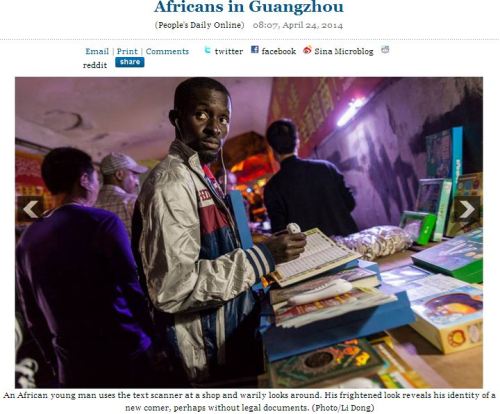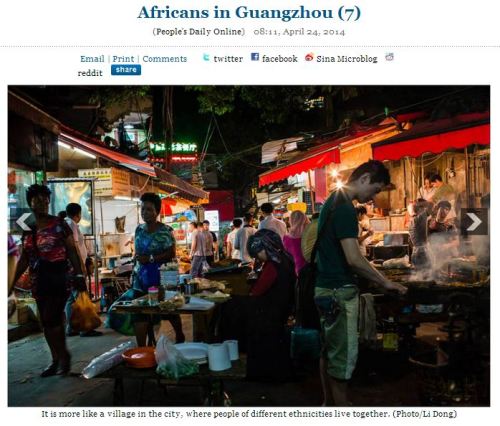
A quote given in a pictorial seen on the People’s Daily Online is not racist at all.
While a picture can tell a thousand words, we’ll let the actual written words speak for themselves in this case:
An African young man uses the text scanner at a shop and warily looks around. His frightened look reveals his identity of a new comer, perhaps without legal documents.
Yeah, that seems to be unfairly judging a person you don’t know anything about with a biased preconception. But, this caption isn’t racist because we’re not getting the full picture here: the true way to enjoy this pictorial is not by the pictures, but through the photographer.
The photo essay is about the African community that resides in Guangzhou. Estimated to have originated in 2002, “Africatown” was the coalescence of a number of Africa traders that continually grew year by year. However, the growth of Guangzhou’s Africatown seems to rely upon the uneasy truce made between the African and Chinese communities which is founded upon the mutual ignoring of each other’s existence.
Well, that didn’t sit well with Li Dong. Two years ago, Li Dong quit his job and decided to fully document the African community in Guangzhou through photography.
But though we have Li’s many photographs of the African community, we really aren’t any closer to understanding them—not by the People’s Online pictorial and it’s rather direct-yet-ambiguous statement. Instead, we need the proper context to relate with—and for that, we have Li Dong himself.
The full story about the African community photographs broke back on April 10, and it did it by telling us about Li Dong: his life, his history, his accolades. The introduction to the story starts off grandly like this:
Man of academics from a famous school, executive of a company, Entrepreneur… Li Dong is a man with many proud labels.
And then majestically reveals the purpose:
Within the two years of observing and living on Baohaozhi Street, he has become the African’s neighbor; from the beginning when people were wary [of his presence] up until the present when he is fully understood, he has slowly used his camera lens to tell the unknown stories of life and struggle of these people from another country.
And then it goes on to tell everything about Li. We are told of Li’s disgrace of losing face as a child when he saw the way Chinese would act around foreigners, and then Li explains how his work is required understanding to achieve a cultural advantage:
“Before, (Chinese) would need to take up the whole day to decide which bottle of mineral water to purchase when outside the country, but now an increasing number of Chinese are (more comfortable) with buying things when abroad. Before, (we Chinese) were wild for foreign trinkets; now, an increasing number of foreigners are instead coming to China to study and get rich…”
Yes, we need to know the all the motivations why someone would do something like this. We need to know that the person doing this is a person of high standing and privilege, after which we can extend our respect to the things he stands for by proxy. Yes, we need read the background first in order to give the proper respect, and then understand later.
The story of the African community in China is in fact Li’s story of why he was compelled to quit his job and devote an entire two years of his life to this project when a weekend wouldn’t do. We don’t need a pictorial telling the stories about the African community in Guangzhou because the real story we need to hear is the one that’s trying to tell it.
And let’s be fair to that quote by the People’s Daily Online: they did say “perhaps”.
Photos: People’s Daily Online
China Insider: Why a Racist Quote in People’s Daily Online Isn’t Racist At All
Posted: 04/25/2014 8:35 pmA quote given in a pictorial seen on the People’s Daily Online is not racist at all.
While a picture can tell a thousand words, we’ll let the actual written words speak for themselves in this case:
Yeah, that seems to be unfairly judging a person you don’t know anything about with a biased preconception. But, this caption isn’t racist because we’re not getting the full picture here: the true way to enjoy this pictorial is not by the pictures, but through the photographer.
The photo essay is about the African community that resides in Guangzhou. Estimated to have originated in 2002, “Africatown” was the coalescence of a number of Africa traders that continually grew year by year. However, the growth of Guangzhou’s Africatown seems to rely upon the uneasy truce made between the African and Chinese communities which is founded upon the mutual ignoring of each other’s existence.
Well, that didn’t sit well with Li Dong. Two years ago, Li Dong quit his job and decided to fully document the African community in Guangzhou through photography.
But though we have Li’s many photographs of the African community, we really aren’t any closer to understanding them—not by the People’s Online pictorial and it’s rather direct-yet-ambiguous statement. Instead, we need the proper context to relate with—and for that, we have Li Dong himself.
The full story about the African community photographs broke back on April 10, and it did it by telling us about Li Dong: his life, his history, his accolades. The introduction to the story starts off grandly like this:
And then majestically reveals the purpose:
And then it goes on to tell everything about Li. We are told of Li’s disgrace of losing face as a child when he saw the way Chinese would act around foreigners, and then Li explains how his work is required understanding to achieve a cultural advantage:
Yes, we need to know the all the motivations why someone would do something like this. We need to know that the person doing this is a person of high standing and privilege, after which we can extend our respect to the things he stands for by proxy. Yes, we need read the background first in order to give the proper respect, and then understand later.
The story of the African community in China is in fact Li’s story of why he was compelled to quit his job and devote an entire two years of his life to this project when a weekend wouldn’t do. We don’t need a pictorial telling the stories about the African community in Guangzhou because the real story we need to hear is the one that’s trying to tell it.
And let’s be fair to that quote by the People’s Daily Online: they did say “perhaps”.
Photos: People’s Daily Online
YOU MIGHT ALSO BE INTERESTED IN: